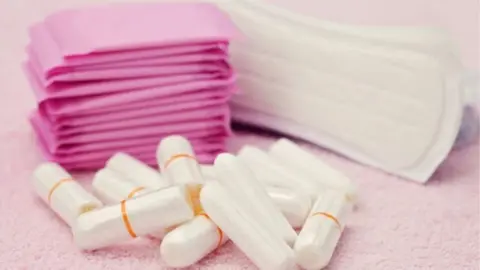Free sanitary products for pupils and students
 Getty Images
Getty ImagesEvery school, college and university in Scotland is to provide free sanitary products under a new £5.2m Scottish government scheme.
The launch of the scheme coincides with the start of the new academic year.
It follows a pilot programme in Aberdeen, while funding has also allowed free availability in some areas to women on low incomes.
The government said the funding aimed to help "banish the scourge of period poverty" among pupils and students.
A recent survey of more than 2,000 people by Young Scot found that about one in four respondents at school, college or university in Scotland had struggled to access sanitary products.
The Scottish government worked on the new scheme with bodies including the Convention of Scottish Local Authorities (Cosla), Colleges Scotland, Universities Scotland and the Scottish Funding Council.
Communities Secretary Aileen Campbell said she was proud that Scotland was taking "world-leading action to fight period poverty" among the country's 395,000 pupils and students.
She said: "In a country as rich as Scotland, it's unacceptable that anyone should struggle to buy basic sanitary products.
"I welcome the support of local authorities, colleges and universities in implementing this initiative.
"Our £5.2m investment will mean these essential products will be available to those who need them in a sensitive and dignified way, which will make it easier for students to fully focus on their studies."
'Great step'
Scottish Labour MSP Monica Lennon, who has brought forward a Member's Bill calling for the Scottish government to provide free female sanitary products "for anyone who needs them", welcomed the move.
She said: "This is another great step forward in the campaign against period poverty.
"Access to period products should be a right, regardless of your income, which is why I am moving ahead with plans for legislation to introduce a universal system of free access to period products for everyone in Scotland.
"No-one should face the indignity of being unable to access these essential products to manage their period."
